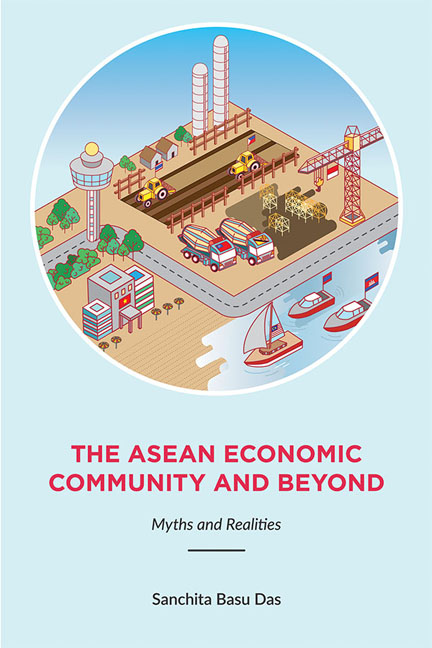Book contents
- Frontmatter
- Dedication
- Contents
- Foreword
- Acknowledgements
- Abbreviations
- 1 Introduction: The ASEAN Economic Community and Beyond
- I THE ASEAN ECONOMIC COMMUNITY (AEC)
- II BEYOND THE ASEAN ECONOMIC COMMUNITY
- 9 The Regional Comprehensive Economic Partnership: Going Beyond ASEAN+1 FTAs
- 10 Comparing ASEAN+1 FTAs for an Effective RCEP
- 11 Challenges in Negotiating the Regional Comprehensive Economic Partnership Agreement
- 12 The Next Decade in ASEAN-U.S. Economic Relations
- 13 RCEP and TPP: Comparisons and Concerns
- 14 The Trans-Pacific Partnership (TPP): Economic and Strategic Implications for the Asia-Pacific
- 15 The Trans-Pacific Partnership as a Tool to Contain China: Myth or Reality?
- 16 RCEP and TPP: Can They Converge into an FTAAP?
- 17 Is APEC's Relevance Fading?
- III AN ASEAN PERSPECTIVE OF REGIONAL CONNECTIVITY
- Appendix: Summary of the Trans-pacific Partnership Agreement
- Index
- About the Author
12 - The Next Decade in ASEAN-U.S. Economic Relations
from II - BEYOND THE ASEAN ECONOMIC COMMUNITY
Published online by Cambridge University Press: 19 May 2017
- Frontmatter
- Dedication
- Contents
- Foreword
- Acknowledgements
- Abbreviations
- 1 Introduction: The ASEAN Economic Community and Beyond
- I THE ASEAN ECONOMIC COMMUNITY (AEC)
- II BEYOND THE ASEAN ECONOMIC COMMUNITY
- 9 The Regional Comprehensive Economic Partnership: Going Beyond ASEAN+1 FTAs
- 10 Comparing ASEAN+1 FTAs for an Effective RCEP
- 11 Challenges in Negotiating the Regional Comprehensive Economic Partnership Agreement
- 12 The Next Decade in ASEAN-U.S. Economic Relations
- 13 RCEP and TPP: Comparisons and Concerns
- 14 The Trans-Pacific Partnership (TPP): Economic and Strategic Implications for the Asia-Pacific
- 15 The Trans-Pacific Partnership as a Tool to Contain China: Myth or Reality?
- 16 RCEP and TPP: Can They Converge into an FTAAP?
- 17 Is APEC's Relevance Fading?
- III AN ASEAN PERSPECTIVE OF REGIONAL CONNECTIVITY
- Appendix: Summary of the Trans-pacific Partnership Agreement
- Index
- About the Author
Summary
In November 2012, the United States and ASEAN agreed on a new framework for economic cooperation, called the U.S.-ASEAN Expanded Economic Engagement or E3. The initiative identified specific ways to facilitate U.S.-ASEAN trade and investment, increase efficiency and competitiveness of trade flows in ASEAN, and build greater awareness of commercial opportunities between the United States and ASEAN business communities. Even prior to that, the United States and ASEAN have significant relationships. The United States is ASEAN's Dialogue Partner since 1977 and the dialogue relations cover areas like political and security, economic and trade, social and cultural and other development cooperation. On economic front, the U.S.-ASEAN bilateral trade and investment relations are well established. While the United States is the fourth largest trading partner of ASEAN, ASEAN is ranked as the fifth largest trading partner of the United States. U.S. FDI stock in ASEAN countries was US$159.5 billion in 2011, up 11.2 per cent from 2010. With the uncertainties in the West, U.S. businesses are increasingly turning to the ASEAN region. Hence, the E3 agreement is viewed as an initiative to pave the way for trade facilitation, development of Information and Communications Technology and Investment principles and additional work on standards development and practices for better trade environment among the eleven countries. The U.S.-ASEAN E3 is also expected to facilitate the ASEAN-U.S. FTA, which can provide a basis for an enlarged TPP that, in the long run, can be transformed into a Free Trade Area of the Asia-Pacific (FTAAP) region.
INTRODUCTION
In November 2012, during the 21st ASEAN Summit in Phnom Penh, the United States and ASEAN agreed on a new framework for economic cooperation. The initiative, named as the U.S.-ASEAN E3 is said to be creating new business opportunities and jobs in all the eleven countries involved. It identifies specific ways to facilitate U.S.-ASEAN trade and investment, increase efficiency and competitiveness of trade flows and supply chains throughout ASEAN, and build greater awareness of the commercial opportunities that the growing U.S.-ASEAN economic relationship presents. It is expected that by working together on the E3 initiatives, the United States can work with ASEAN countries to prepare to join high-standard trade agreements, like the Trans-Pacific Partnership (TPP), which currently include only four ASEAN countries — Brunei, Malaysia, Singapore and Vietnam.
- Type
- Chapter
- Information
- The ASEAN Economic Community and BeyondMyths and Realities, pp. 125 - 138Publisher: ISEAS–Yusof Ishak InstitutePrint publication year: 2015

